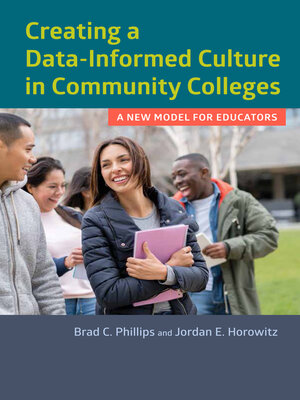Creating a Data-Informed Culture in Community Colleges
ebook ∣ A New Model for Educators
By Brad C. Phillips

Sign up to save your library
With an OverDrive account, you can save your favorite libraries for at-a-glance information about availability. Find out more about OverDrive accounts.
Find this title in Libby, the library reading app by OverDrive.



Search for a digital library with this title
Title found at these libraries:
| Library Name | Distance |
|---|---|
| Loading... |
Brad C. Phillips and Jordan E. Horowitz offer a research-based model and actionable approach for using data strategically at community colleges to increase completion rates as well as other metrics linked to student success. They draw from the fields of psychology, neuroscience, and behavioral economics to show how leaders and administrators can build good habits for engaging with data constructively.
At the core of their approach is a strategic effort to help administrators and faculty identify leading indicators that they can affect and monitor before student failure occurs. The book also helps educators make better use of common sources of data, clarify problems to be solved, match research-based interventions to problems, and evaluate results.
The authors incorporate strategies for college personnel to engage with data more effectively by integrating student stories into presentations and embedding these discussions into existing meetings and routines. Three case studies from Long Beach City College, Southwestern College, and Odessa College further illustrate how this approach was implemented as part of comprehensive reform efforts.
Based on two decades of experience working with colleges across the country, Creating a Data-Informed Culture in Community Colleges promises to be a valuable contribution to the ongoing conversation about information use in education to improve student outcomes.
At the core of their approach is a strategic effort to help administrators and faculty identify leading indicators that they can affect and monitor before student failure occurs. The book also helps educators make better use of common sources of data, clarify problems to be solved, match research-based interventions to problems, and evaluate results.
The authors incorporate strategies for college personnel to engage with data more effectively by integrating student stories into presentations and embedding these discussions into existing meetings and routines. Three case studies from Long Beach City College, Southwestern College, and Odessa College further illustrate how this approach was implemented as part of comprehensive reform efforts.
Based on two decades of experience working with colleges across the country, Creating a Data-Informed Culture in Community Colleges promises to be a valuable contribution to the ongoing conversation about information use in education to improve student outcomes.







